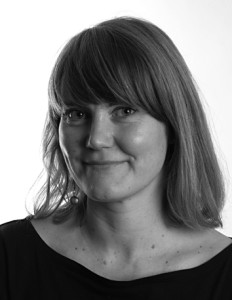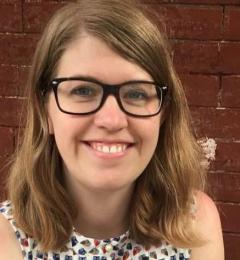IMER Abroad: PROVIR Seminar – Precarious migrants and access to welfare: Between policy, law and practice
This workshop will discuss the legal and experienced dilemmas found in the encounter between migrants living in a legally precarious situation and the welfare state in which they reside. Participants will present ongoing empirically based research on migrants’ access to welfare in policy, law and practice in various European countries. They will also discuss the particular position of youth and children in vulnerable situations. The program is available here.
Lessons from the past: framing post-war immigration in Germany by historical analogies
In many West European countries, the experience of mass immigration after 1945 was perceived as something basically new and unprecedented. In the lengthy process of coming to terms with the new situation and of developing a self-understanding as countries of immigration and of ethnic pluralism, historical arguments often played an important role. By placing present-day immigration into a historical perspective, by constructing narratives of continuity (and discontinuity) and not least by presenting persuasive historical analogies, historians (and others) introduced arguments that informed the debates of the day and allowed the experiences of immigration and multi-ethnicity to be integrated into (national) narratives of identity. The German case is particularly interesting in this respect, since a tradition of tolerance and successful integration had to be invented in spite of the fresh memories of the Nazi-past that were witness to the contrary.
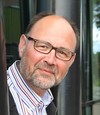 Christhard Hoffmann (born 1952 in Luneburg, Germany) is a German historian and professor of modern European history at the University of Bergen. In the period 2007-2013 he was Head of the Department of Archaeology, History, Cultural Studies and Religion.
Christhard Hoffmann (born 1952 in Luneburg, Germany) is a German historian and professor of modern European history at the University of Bergen. In the period 2007-2013 he was Head of the Department of Archaeology, History, Cultural Studies and Religion.
Hoffmann defended in 1986 his doctoral dissertation on German Antiquity historians’ representation of Jews and Judaism in the 19th and 20th centuries [1] at the Technische Universität Berlin, where he also worked as a researcher for many years. From 1994 to 1998 he was a visiting professor at the University of California, Berkeley, and since 1998 he has worked at the University of Bergen.
Hoffmann has an extensive list of publications in the fields of German-Jewish history and cultural history, history of anti-Semitism and migration history.
Communicating Migration Seminar series
The IMER seminar series for 2014 will cover how migration and ethnic relations are communicated in every-day encounters, in mass and social media, in politics and in teaching at the universities. Has the way people talk about migration and migrants in different social contexts changed over time, and in which ways has it changed? How does migration theory and research fit in with other topics and theories in the social sciences, and how do results from migration research inform public debate and policy development?
Communicating migration will be discussed from various angles in our seminar series on international migration and ethnic relations during spring and autumn 2014. We welcome papers that touch upon this broad theme from different angles. Historical analyses of change over time in regard to politics and public debate, research foci and disciplinary concerns are specifically welcomed.
COMMUNICATING MIGRATION SEMINARS: ESPEN HELGESEN – “Your dad is looking for you” – Children’s perspectives on state intervention in immigrant families in Norway
Several recent international news stories have described state-initiated forced separation of children and parents in Norway, illustrating how local decisions in the Child Welfare Service can have widespread ramifications outside the families involved. In this paper I draw on ethnographic fieldwork among immigrant families in Kristiansand, Norway, to show how a group of children responded when one of their friends suddenly disappeared. The secrecy surrounding the inner workings of the Child Welfare Service led the children to frame the incident as a “kidnapping”, and several children expressed fear that they, too, would be separated from their families. Frustrated with the lack of an explanation of what had happened to their friend, the children turned to online worlds, where they could express their fears and concerns by sharing artwork with friends outside the adult gaze.
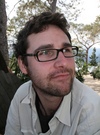 Espen Helgesen is a PhD candidate at the Department of Social Anthropology, University of Bergen, currently finishing his thesis on technology-mediated sociality and self-formation among children of immigrants in Norway.
Espen Helgesen is a PhD candidate at the Department of Social Anthropology, University of Bergen, currently finishing his thesis on technology-mediated sociality and self-formation among children of immigrants in Norway.
Communicating Migration Seminar Series IMER Bergen spring and autumn 2014
The IMER seminar series for 2014 will cover how migration and ethnic relations are communicated in every-day encounters, in mass and social media, in politics and in teaching at the universities. Has the way people talk about migration and migrants in different social contexts changed over time, and in which ways has it changed? How does migration theory and research fit in with other topics and theories in the social sciences, and how do results from migration research inform public debate and policy development? Communicating migration will be discussed from various angles in our seminar series on international migration and ethnic relations during spring and autumn 2014. We welcome papers that touch upon this broad theme from different angles. Historical analyses of change over time in regard to politics and public debate, research foci and disciplinary concerns are specifically welcomed. The seminar series will end with a two-day conference in October/November 2014.
IMER Seminar:
Elaine Chase and Jenny Allsopp: The ‘tactics’ of time and status: Young people subject to immigration control making the transition to ‘adulthood’ in the UK
Young people who arrive in the UK from outside Europe without a parent or legal guardian are institutionally categorised according to a range of possible legal statuses and usually afforded time-limited Leave to Remain in the UK. These categorisations are associated with specific welfare entitlements which tend to diminish over time and become particularly uncertain as young people transition into ‘adulthood’. Situated within a broader research programme examining the link between migration, ‘wellbeing’ and ‘futures’, this paper examines the multiple transitions imposed on young people subject to immigration control as they approach the age of 18 and beyond, (from child to ‘adult’, from being accorded a temporary residence permit to more permanent leave to remain or from legality to ‘illegality’) and the implications for their access to various dimensions of welfare provision. The paper shows how different components of the ‘state’ have time limitations at their disposal to control access to welfare and state support according to chronological age. From young people’s perspectives, such ‘tactics’ fundamentally control their trajectories and future prospects unless they can formulate strategies of their own to counter such tactics.
Read more about Elaine Chase here
Read more about Jenny Allsopp here
Mistillitens migrasjon: Europeisk sør-nord mobilitet i kjølvannet av krisa
Tema for innlegget er den nye Europeiske sør-nord migrasjonen. Den empiriske analysen er basert på dybdeintervjuer med noen av dem som har reist fra Spania til Norge etter kriseåret 2008. Innlegget vil belyse hvordan sør-nord migrasjonen i kjølvannet av krisa er mer enn en desperat flukt fra arbeidsledighet i hjemlandet. Den vidtrekkende mistilliten til det politiske systemet og følelsen av en dyptgripende håpløshet i hjemlandet er viktige migrasjonsfaktorer i tillegg til jobbmuligheter for dem som kommer til Norge.
Susanne Bygnes (phd) er postdoktor ved universitetet i Bergen. Hun leder det fireårige prosjektet Labour Migration in Uncertain Times: Migration from Spain to Norway after 2008, finansiert av forskningsrådets VAM-program. Hun har publisert en rekke internasjonale artikler på tema som mangfold og likestilling, blant annet Ambivalent Multiculturalism (2012) i tidsskriftet Sociology.
IMER Lunch: Astrid Ouahyb Sundsbø – Social mixing policies: What You Want and What You Get
In the public debate and contemporary social policies in Norway as well as in other countries, concentrations of “immigrants” in certain areas of a city are considered to be unfortunate and something which needs to be fought against (see i.e. Gakkestad 2003; Akerhaug 2012). It is anticipated that spatial concentrations of “immigrants” enforces the social isolation of “immigrants” and triggers criminal activities, among other aspects. This becomes very obvious when a “high percentage of immigrants” in an area serves as basis for referring to that area as a “ghetto” or “insecure” (see i.e. Sæter 2005; Vassenden: 2007; cf. Akerhaug 2012).
In this lunch seminar, the idea of social mixing, which is not just common in the general public debate but also a manifested major urban policy and planning goal (Sæter & Ruud 2005; Huse, Sæter & Aniksdal 2010; cf. Musterd 2005) will be discussed. By using some illustrations both from the academic debate as well as own empirical work, it is shown that it is necessary to be critical about this concept.
It is referred to literature arguing that there is a lack of empirical evidence showing that the residential segregation of “immigrants” has any effect at all, for instance on “integration” and crime (for instance Musterd 2005; Galster 2007; Lees 2008). Furthermore, it is discussed that the imagination of social mixing as an ideal way to tackle the “multicultural challenge” might be founded on a highly problematic understanding of “immigrants“ and their norms and values as inherently “bad” (cf. Eriksen 1996: 51). This is shown by drawing on statements from interviews with members from the majority population residing in Oslo.
Astrid Ouahyb Sundsbø
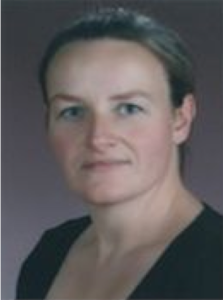 Astrid Ouahyb Sundsbø (PhD) is a postdoctoral research fellow at the Georg-Simmel Center for Metropolitan Studies in Berlin. She holds a doctoral degree in sociology from the Humboldt-University of Berlin (2012). From 2012-2014 she worked as a postdoctoral researcher at the Center for a Sustainable University at the University of Hamburg. Her main fields of research compromise: Social inequality, residential segregation in cities, migration and interethnic relations. Her most recent publication is Grenzziehungen in der Stadt. Ethnische Kategorien und die Wahrnehmung und Bewertung von Wohnorten (Springer VS, 2014) where it is discussed whether ethnic boundary making on the side of the majority population could be a possible explanation for the residential concentration of immigrants in Berlin and Oslo.
Astrid Ouahyb Sundsbø (PhD) is a postdoctoral research fellow at the Georg-Simmel Center for Metropolitan Studies in Berlin. She holds a doctoral degree in sociology from the Humboldt-University of Berlin (2012). From 2012-2014 she worked as a postdoctoral researcher at the Center for a Sustainable University at the University of Hamburg. Her main fields of research compromise: Social inequality, residential segregation in cities, migration and interethnic relations. Her most recent publication is Grenzziehungen in der Stadt. Ethnische Kategorien und die Wahrnehmung und Bewertung von Wohnorten (Springer VS, 2014) where it is discussed whether ethnic boundary making on the side of the majority population could be a possible explanation for the residential concentration of immigrants in Berlin and Oslo.
Redigert av Christine Jacobsen, Synnøve Bendixsen, Karl Harald Søvig
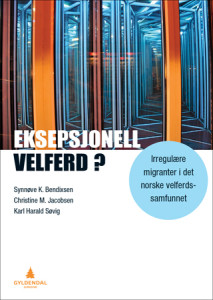 Irregulære immigranter har på noen områder full tilgang til velferdsytelser, men på mange områder er tilgangen svært begrenset enten i form av rettsregler eller andre barrierer. Denne antologien undersøker forholdet mellom rettslig rammeverk, institusjonell praksis og hvordan irregulære migranter selv erfarer sin situasjon.
Irregulære immigranter har på noen områder full tilgang til velferdsytelser, men på mange områder er tilgangen svært begrenset enten i form av rettsregler eller andre barrierer. Denne antologien undersøker forholdet mellom rettslig rammeverk, institusjonell praksis og hvordan irregulære migranter selv erfarer sin situasjon. Med en unik kombinasjon av juridisk og antropologisk blikk, går boken regelverket nærmere i sømmene, drøfter gatebyråkraters utfordringer og hverdagslivet til irregulære migranter og deres barn.
Hvilke regelverk får konsekvenser for irregulære migranters levevilkår? Hvordan blir dette regelverket forstått og etterfulgt av gatebyråkrater? Og hvordan blir hverdagslivet til irregulære migranter og deres barn påvirket av regelverket og dets fortolkning?
Denne boken er aktuell for velferdsprofesjoner som møter irregulære migranter som en del av sin yrkesutøvelse. Både leger, sykepleiere, helsesekretærer, lærere, helsesøstre, skolerådgivere, sosialarbeidere, sosionomer og barnevernspedagoger vil ha god nytte av Eksepsjonell velferd? Irregulære migranter i det norske velferdssamfunnet. Boken retter seg også mot frivillige organisasjoner som jobber med ulike aspekter ved migranters situasjon i Norge og andre som er engasjert i temaet.
Susanne Wessendorf: Pioneer migrants in a super-diverse context
Urban areas in Europe and beyond have seen significant changes in patterns of immigration, leading to profound diversification. This diversification is characterized by the multiplication of people of different national origins, but also differentiations regarding migration histories, religions, educational backgrounds, legal statuses and socio-economic backgrounds. This ‘diversification of diversity’ is now commonly described as ‘super-diversity’. Despite an increasing number of studies looking at how people live together in such super-diverse contexts, little is known about new patterns of immigration into such contexts. What are the newly emerging countries of origin which add to the diversification of already super-diverse areas? Where do recent migrants from unusual source countries, who cannot draw on already existing migrant or ethnic ‘communities’, find support? And what kinds of social networks do they form? This paper discusses pathways of settlement among recently arrived migrants from non-traditional countries of origin in the London Borough of Hackney. Drawing on earlier migration literature and the notion of ‘pioneer migration’, the paper addresses the challenges of analysing increasingly fragmented migration stories and pathways of settlement in super-diverse contexts.
Thomas Hylland Eriksen: The tension between superdiversity and cultural reproduction
From a bird’s eye perspective, Alna borough in eastern Oslo definitely looks superdiverse. Scores of languages are spoken in its population of 40,000, and its inhabitants come from about as many countries. Yet at the local level, social and cultural reproduction takes place to a great extent at the ethnic or community level. As one of our informants says, ‘I sometimes feel as though I am in Pakistan’. Had it not been for the strong presence of the Norwegian state, the suburb would have resembled the plural societies described in the mid-20th century by Furnivall and Smith, where ethnic groups, like pearls on a necklace, lead parallel lives but meet in the marketplace. How comprehensive is the influence of the state; in what ways does diversity in public affect the private sphere, and what are the main elements in the cultural reproduction of minority groups?
Kicking off a new semester with IMER lunch seminars, our first seminar this year is building on exciting fieldwork from Bergen. Hilde Danielsen from Uni Research Rokkansenteret is giving a presentation about the symbolic value of birthday parties in contemporary Norway.
Danielsen argues that birthday celebrations have become more than a private family matter, and are increasingly seen as a socially charged question in Norwegian society. Many parents with and without migration background, as well as teachers and other actors, claim that birthday parties have the potential to create social inclusion. They are especially concerned that children with migrant background should celebrate and attend. Celebrating birthdays has seemingly become one of the litmus tests of whether an immigrant individual or an immigrant group is integrated into Norwegian society.
Note the place: Lauritz Meltzers hus (SV-bygget), room 212.
As usual, a light lunch will be served. All are welcome!
If a LGBTI person can “stay in the closet” in the country of origin, should she then be denied asylum as a refugee? This is currently a thorny issue for several European countries, when facing asylum seekers who apply for protection on the basis of their sexual orientation or gender identity. For this IMER seminar, Andrea Grønningsæter from the faculty of law at UiB will discuss how this is currently practiced in Norway.
Research has shown that that LGBTI people (lesbian, gay, bisexual, trans and intersex people) often face specific legal and procedural challenges when applying for refugee status. In a number of jurisdictions, including Norway, LGBTI asylum seekers have been denied refugee status with reference to the fact that they can abstain from behavior that may result in a risk of persecution. A gay person can live as a gay within the confines of the home, for example, but not on the streets – and may thus not be granted protection. It is then concluded that the requirement in refugee law of establishing a ‘well-founded fear’ of persecution is not fulfilled, because concealment will mean that the asylum seeker is not revealed to potential persecutors.
In 2012 the Norwegian Supreme Court considered the right to refugee status based on sexual orientation (Rt. 2012 s. 494). In the court’s decision it was stated that a gay person may not be required to hide their sexual orientation in the country of origin to avoid persecution. In cases where it is concluded that the asylum seeker will choose to conceal their sexual orientation, the court established a step-by-step approach for assessing whether the asylum seeker is entitled to refugee status.
For her PhD project, Grønningsæter looks at how the approach that was established by the Supreme Court in 2012 for assessing asylum cases based on sexual orientation or gender identity is interpreted by the courts and the immigration authorities. She explores how the courts and immigration authorities establish the asylum seeker’s reason for concealment, as well as how concepts such as ‘being open’ or ‘discreet’ about sexual orientation or gender identity is understood.
A light lunch will be served. Welcome!
Andrea Grønningsæter is a PhD candidate at the Faculty of Law, Bergen University.

